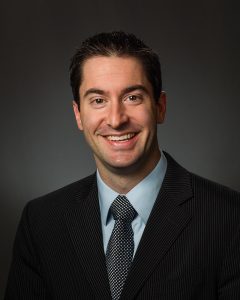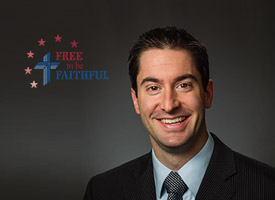By Adriane Heins
When it comes to how the Supreme Court of the United States (SCOTUS) may rule in June on the upcoming same-sex marriage case, Jim Campbell — senior legal counsel with Alliance Defending Freedom, Center for Marriage and Family director and key litigator in high-profile cases across the nation — told LCMS members May 28 that “unlimited options are available to the court because the case is so complex.”
Campbell offered insight into the case via a webinar hosted by “Free to be Faithful,” the Synod’s education and awareness initiative regarding marriage, life and religious liberty. He also outlined the case the court is confronted with: first, leaving the issue of the legality of same-sex marriage up to

individual states, and second, determining if individual states must issue marriage licenses to same-sex couples — or at least recognize the same-sex marriages of out-of-state couples.
He believes there are two likely outcomes: one characterized as a decision “that would essentially affirm that a state may continue to define and understand marriage … as a union of a man and a woman” and one as a decision creating “same-sex marriage in all 50 states and that marriage would be redefined across the nation.”
Ultimately, Campbell noted, “It’s anyone’s guess how the court will rule.”
Campbell also took questions from those attending the webinar, such as whether or not churches could lose their tax-exempt status if they disagree with same-sex marriage. Campbell noted this question was also posed in the case’s oral arguments before the Supreme Court, with Solicitor General Donald Verrilli Jr. answering, “It’s certainly going to be an issue. I don’t deny that.”
Campbell also explained, “We would expect to see … issues with tax exemptions [with regard to] schools, universities, Christian universities, Lutheran universities, other universities that operate on traditional religious principles that affirm marriage as the union of a man and a woman.”
Other attendees wondered how the ruling could affect The Lutheran Church—Missouri Synod and all people of faith.
“If the court rules that these marriage laws — or this understanding of marriage [as a union of one man and one woman] — [are] irrational or motivated by animus,” Campbell explained, “this poses problems for religious liberty. … That will essentially be a tool used against people of faith for years to come.”
Organizations outside churches and schools will be affected as well, he said. The potential redefinition of marriage will have “an impact on religious adoption and foster agencies. We’ve already seen in the District of Columbia, Massachusetts and Illinois, there has been a redefinition of marriage or a recognition of same-sex relationships, and Catholic Charities and other faith-based organizations have been driven out of adoption and foster care, [no longer able to] provide those services for people in the community.”
Additionally, he said, “Those operating their business and trying to do so consistent with their religious belief on marriage could face government attack and government retaliation. … We’ve seen public officials that have religious beliefs regarding marriage forced out of their positions.”
When asked if there may come a day when LCMS clergy may no longer be able, in good conscience, to function as agents of the state with regard to marriage, Campbell said, “It is certainly a possibility. … Justice Scalia, during the oral argument, made that very point. ‘If we mandate this redefinition of marriage … then how in the world can Christian pastors and other clergy that affirm marriage as the union of a man and woman continue to be agents of the state?’”
While “there are plenty of good arguments to say that the free exercise of religion does not allow the government to essentially drive people of faith out of this particular participation in the body politic and it doesn’t allow them to marginalize people of faith in this way,” Campbell also added, “do I foresee a time when a state might try to push Christian pastors out of that role? I do think that we could see that.”
But despite how the court may rule, Campbell believes the way forward remains clear. “We should continue … to restore a proper understanding and appreciation of marriage in our culture,” he said. “Marriage is not government recognition of a loving relationship. Marriage is a union that connects a child to both a mom and dad by connecting the mom and the dad to each other.”
He also encouraged Lutherans and all Christians to remember that “it’s important not only to communicate the truth but also to live it. The Church needs to reflect the truth about marriage, not just in what we say but in how we live.”
“No matter what the court does,” he explained, “there is a truth about marriage, and I believe all of us have a role to play in sharing that truth with our neighbors, our colleagues and those we interact with on a daily basis.”
The webinar is archived at video.lcms.org/archives/3102. Visit lcms.org/freetobefaithful to find more resources on marriage, life and religious liberty.
Adriane Heins (adriane.heins@lcms.org) is managing editor of The Lutheran Witness and editor of Catechetical Information for LCMS Communications.
Posted May 29, 2015
